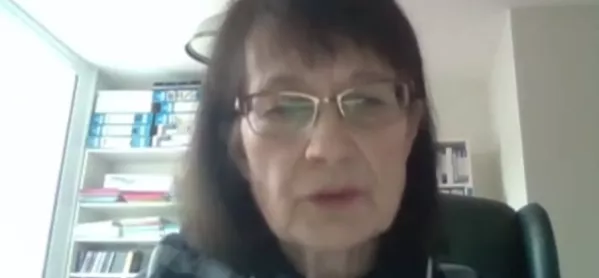A teaching union has claimed that the government’s evidence to MPs that school pupils are not a “significant driver” of Covid infections in the community contradicts its own scientific advisers.
The discrepancy has been highlighted in an exchange of letters published this week by an influential parliamentary committee.
The NEU teaching union’s joint general secretaries, Mary Bousted and Kevin Courtney, have questioned answers provided by deputy chief medical officer Dr Jenny Harries about the impact of schools on the spread of the virus.
Coronavirus: Gavin Williamson claim over new variant was ‘simply not true’, says council leader
Union: NEU questions Williamson’s claim that schools are not spreading virus
School safety: New variant may spread among pupils more effectively, expert warns
Dr Harries told the Commons Education Select Committee last week that children were not “as far as we can see” a significant driver of large-scale community transmission.
Coronavirus: Are pupils in school major spreaders?
She told MPs that, in fact, it was the other way around and that where there is a rise in community rates of the coronavirus, you would see a rise in children as well.
However, the NEU leaders say this claim is contradicted by an official report from SAGE (the government’s Scientific Advisory Group for Emergencies), which found that school pupils up to the age of 16 were twice as likely to spread the virus within their households as people who are 17 or older.
The NEU general secretaries wrote to both the committee and to chief medical officer Chris Whitty to challenge the evidence that Dr Harries gave to MPs last week.
Prof Whitty has responded in a letter to committee chairman Robert Halfon to say that he does not think any of Dr Harries’ statements were “intentionally or inadvertently misleading, given our current state of knowledge”.
Dr Harries was asked by MPs about the new variant of Covid and its transmission risk in schools.
She replied: “I think what we should say, overall, is that school children definitely can transmit infection in schools. They can transmit it in any environment, but it is not a significant driver as yet, as far as we can see, of large-scale community infections.
“Rather it is the other way round, that if there is a rise in community rates, you will see a rise in children as well.”
A letter from the NEU general secretaries said “this evidence seems to contradict” a SAGE report from the Children’s Task and Finish Group, which was published in November and updated last month.
This report says that: “Young people (aged 2 to 16) are much more likely than those aged 17+ to be the first case in their household. In particular, those aged 12 to 16 are nearly 7 times as likely to be the first case in their household, compared to those 17+… Children aged 16 or under are less likely to get the virus from someone within their household compared to people aged 17+.”
In a letter to Mr Halfon responding to the NEU concerns, Professor Whitty said: “I gather you want me to comment on correspondence from the National Education Union (NEU).
“I do not consider any of the statements that Dr Harries made, that are highlighted within their letter, intentionally or inadvertently misleading, given our current state of knowledge. Clearly our state of knowledge develops over time, and different people will phrase the same points using the same data differently with no bad intent.
“The NEU have their own view of the evidence, which is perfectly reasonable they put forward, but senior public health officials should give an independent view, which Dr Harries did.”
